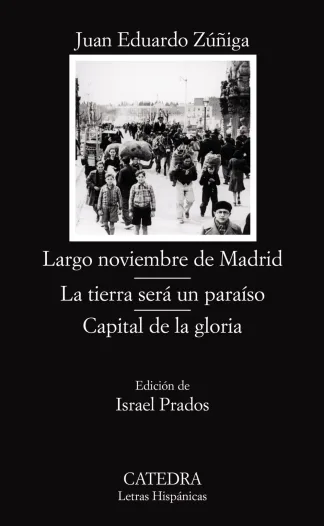
Juan Eduardo Zúñiga
Capital de la gloria is the final installment in Juan Eduardo Zúñiga’s Madrid trilogy, a work that explores the Spanish Civil War in rich and darkly elegiac stories. Published in 2003, close to 25 years after the first volume, Zúñiga’s work is still haunted by the war and the personal costs. It is a take that is both personal, and regional, an attempt to capture the city, Madrid in the man, and the man in a besieged and ultimately destroyed city. The title is taken from a Rafael Alberti poem of the same name. Alberti’s poem, written in 1937, is marked with the same destruction and scars of war, but it is also a poem of resistance and hope, where the future is bright, or as the title of the second volume says, “the country will be a paradise.” Sixty-six years later, it’s a melancholic, if not ironic, statement of what could’ve been and never was.
If Largo noviembre de Madrid focused on the early days of the war in Madrid, and La tierra será un paraíso the immediate post war of the early 1940’s, Capital focuses on memory and the war. In a shift of perspective, there are several fist person stories told from some distance. It is never clear how far from the war in time the narrator is, but act of memory is a form of resistance against the dictatorship. Where the characters of La tierra were in active resistance cells, if impotent, these narrators are so resigned to their fate that the memorization often comes with the fear that all will be forgotten. It is realization that comes with the a sense of loss, one that questions the utility of war. That emotion, however, is not one that repudiates the war, but focuses, as do all of Zúñiga’s stories, on the personal, so that the narrator or the principle character is experiencing these questions through the memory of a lost friend or loved one. In Patrullua de amanecer, Ruinas, el trayecto: Guerda Taro, or El amigo Julio, there is a questioning what did the dead achieve. In the first, a son remember his father’s execution at the end of the war, because he had led a morning patrol that robbed the rich while supposedly looking for fifth columnists. In Ruinas, a demobilized soldier traces the last days of Gerda Taro, the young war photographer killed in 1937, and wonders if she will be forgotten. There is not answer, of course, even for the narrator of El amigo Julio relates the story years later.
For Zúñiga the answer itself isn’t clear. What is, is his devotion remembering the lives of those who experienced it. That experience is as much physical as mental, and Madrid is an ever present backdrop, showing the scars of the war, of course, but also providing a panorama where the characters can move through and express the various aspects of the war. The Hotel Florida, which in the first book is the haunt of Hemingway, is now a place of ghosts and the dead. The city itself becomes not only the physical manifestation of loss, but a place where memory resides. This is the power of much of Zúñiga’s work, especially in Largo noviembre and this book. He captures the characters as much through their surroundings as their interactions, their intellectual reactions to what they are experiencing. War offers a wider pallet for this, but Zúñiga is a subtle portraitist who finds in the physical reflections of his characters.
That said, what makes Zúñiga so compelling is his realization that much of what the characters experience, fleeting love, fear, loneliness, power, all belongs to some form of illusion.
…fue duro aceptar que cada ser humano crea sus fantasías que hacen vivir e ir adelante: para unos era cumplir con los deberes de conciencia, para otros, la ilusión de los amores; después, a unos soló quedaría el vació de la desilusión.
Where Alberti wrote calls to action, Zúñiga is pessimistic. Even with the end of the dictatorship in the mid 1970’s, the sense of such futile loss. In Zúñiga, the characters change through little acts of survival, some petty, some futile, at times even noble, but the result is a hollowing out of humanity. Although not the strongest story of the collection, he ends with a small fable about a whose school is destroyed by artillery. The lesson is clear: the next generation is learning the real lesson of war. Education doesn’t matter, only war.
Although the collection ends on a down note, the three volumes that comprise the Madrid trilogy are masterpieces of memory and resistance, written by a master. Certainly a must read.